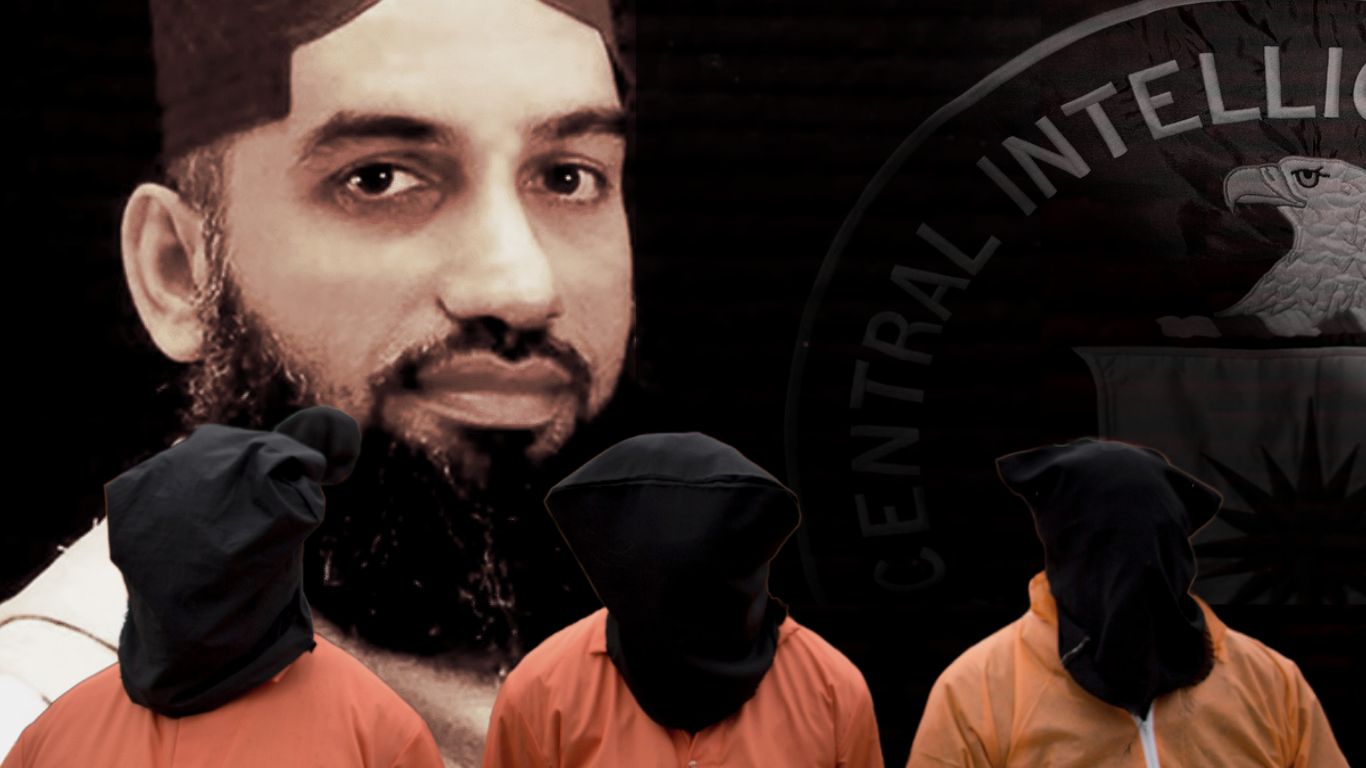GUANTANAMO BAY, CUBA — In March the CIA declassified a 2008 CIA Inspector General report on the agency’s treatment of 9/11 suspect Ammar al-Baluchi at overseas ‘black sites’ and Guantanamo Bay. The report was released as a result of legal submissions and its shocking contents offer an unprecedentedly candid snapshot of the brutal physical and psychological torment to which he and hundreds of others were subjected by the agency over many years, under its global torture program.
The nephew of purported 9/11 mastermind Khalid Sheikh Mohammed, Baluchi was arrested in Pakistan in April 2003. He was accused of serving as a “key lieutenant” within al-Qaeda and its chief “bagman,” having provided pivotal financial and logistical support to the 9/11 hijackers. U.S. officials declared his capture would offer crucial information on the plot, prevent future attacks by the terrorist group, and potentially even lead to the apprehension of Osama bin Laden. Despite years of incarceration, interrogation and torture, none of this proved to be true.
Quoting contemporary cables, the Inspector General’s report tracks Baluchi’s induction at the “Salt Pit,” a CIA black site in Afghanistan, in detail. New arrivals were physically examined, their beards and heads shaved, and then put through a “non-enhanced” psychological assessment to determine their “willingness to cooperate without enhanced techniques…displace their expectations and begin the conditioning of subjects.”
The cable’s nameless author stated that, depending on his “resistance level,” staff did not intend to employ enhanced techniques against Baluchi “unless directed by headquarters.”
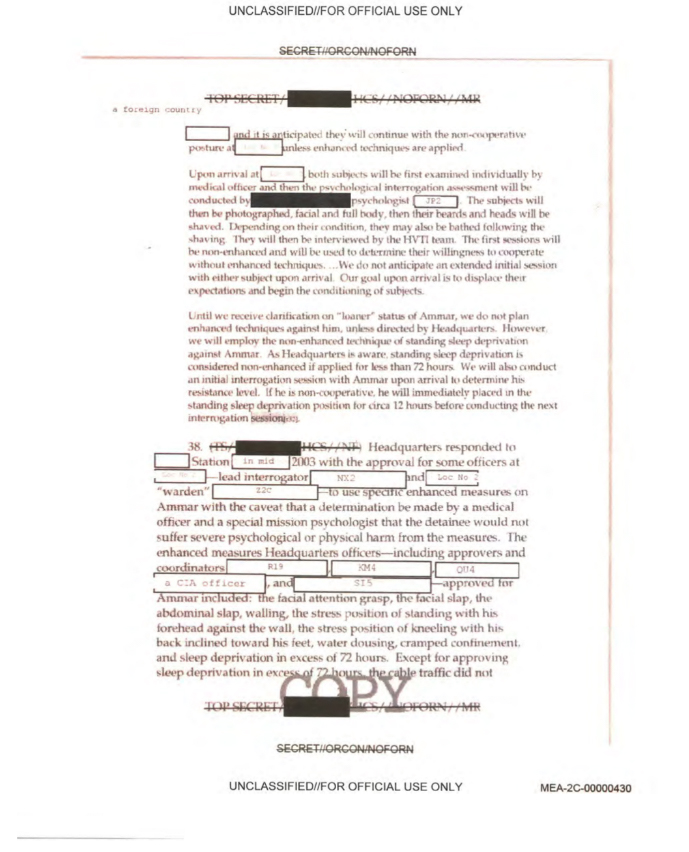
.
The distinction between enhanced and non-enhanced interrogation methods was evidently something of a misnomer. If initially uncooperative, Baluchi would be “immediately” placed in the “standing sleep deprivation position” for up to 12 hours; this agonizing technique was considered “non-enhanced” if applied for less than three days.
In response to the cable, CIA HQ at Langley signed off on a welter of enhanced techniques to be used on Baluchi, including “the facial attention grasp,” facial and abdominal slaps, numerous excruciating stress positions, “cramped confinement,” sleep deprivation lasting up to 180 hours, dousing with freezing water, starvation, “loud music or white noise” 24 hours a day, cessation of access to reading material, and “walling” – slamming his head against a flat surface.
Based on his initial psychological evaluation, it was ruled that none of these unspeakable horrors would inflict “permanent psychological or emotional harm” on Baluchi. This was the universal approach to using “enhanced techniques,” based on the assumption that their use in U.S. military SERE (Survival, Evasion, Resistance and Escape) training did not cause lasting harm. But, while in SERE training the subject is typically confined for only a couple of days, and knows it is training and they will soon be released, the black site prisoners had to endure months or years of brutalizing treatment, with little to no prospect of escape.
“Severe brain damage”
The Inspector General notes that CIA superiors offered little to no clarity on “how many times or for how long interrogators could perform a particular measure or combination of measures.” This may well account for why Salt Pit interrogators “applied some of the measures exuberantly.”
Their ‘exuberance’ was no doubt also influenced by Baluchi’s disobliging response to torture techniques. One CIA operative at the site recorded how the inmate’s “presentation” had “elicited the strongest reactions from interrogators.” His attitude was considered “dismissive, condescending, and arrogant,” typified by “obvious stonewalling, minimizing, and denying,” which served to “frustrate” his captors “and make a difficult task even harder.”
Still, some interrogators seemingly sympathized with Baluchi. One, with whom he spent a “significant amount of time,” described him as “one of the more intelligent or ‘bookish’ of the detainees.” Another regretted the monstrous methods to which they’d subjected Baluchi, stating “I wished I’d never been asked” to do so, and “wouldn’t do them again.”
Likewise, when Baluchi was submerged in a bath of “excessively cold” icy water, on at least one occasion an interrogator was “so uncomfortable with the technique he sat outside the dousing room” to avoid witnessing it first-hand. Another admitted to the Inspector General that this practice was “probably…outside the bounds of what we were supposed to be doing.” A similar strategy killed Salt Pit inmate Gul Rahman in November 2002.
By contrast, CIA torturers had no reservations whatsoever about using Baluchi as a “training prop.” Several new interrogators at the site, “who had only two weeks of classroom instruction,” needed “on-the-job practice for certification”: Baluchi represented “an opportunity to demonstrate their knowledge of techniques,” in particular “walling.”
After he was stripped naked, interrogators “lined up” one-by-one to slam Baluchi’s head into plywood – and, on occasion, concrete – walls over and over again, until they became “fatigued,” whereupon another would take their place, in sessions lasting up to two hours. A CIA operative interviewed by the Inspector General claimed this method was “meant more for ‘sensation’ than to hurt the detainee,” and “simply made a big noise.”
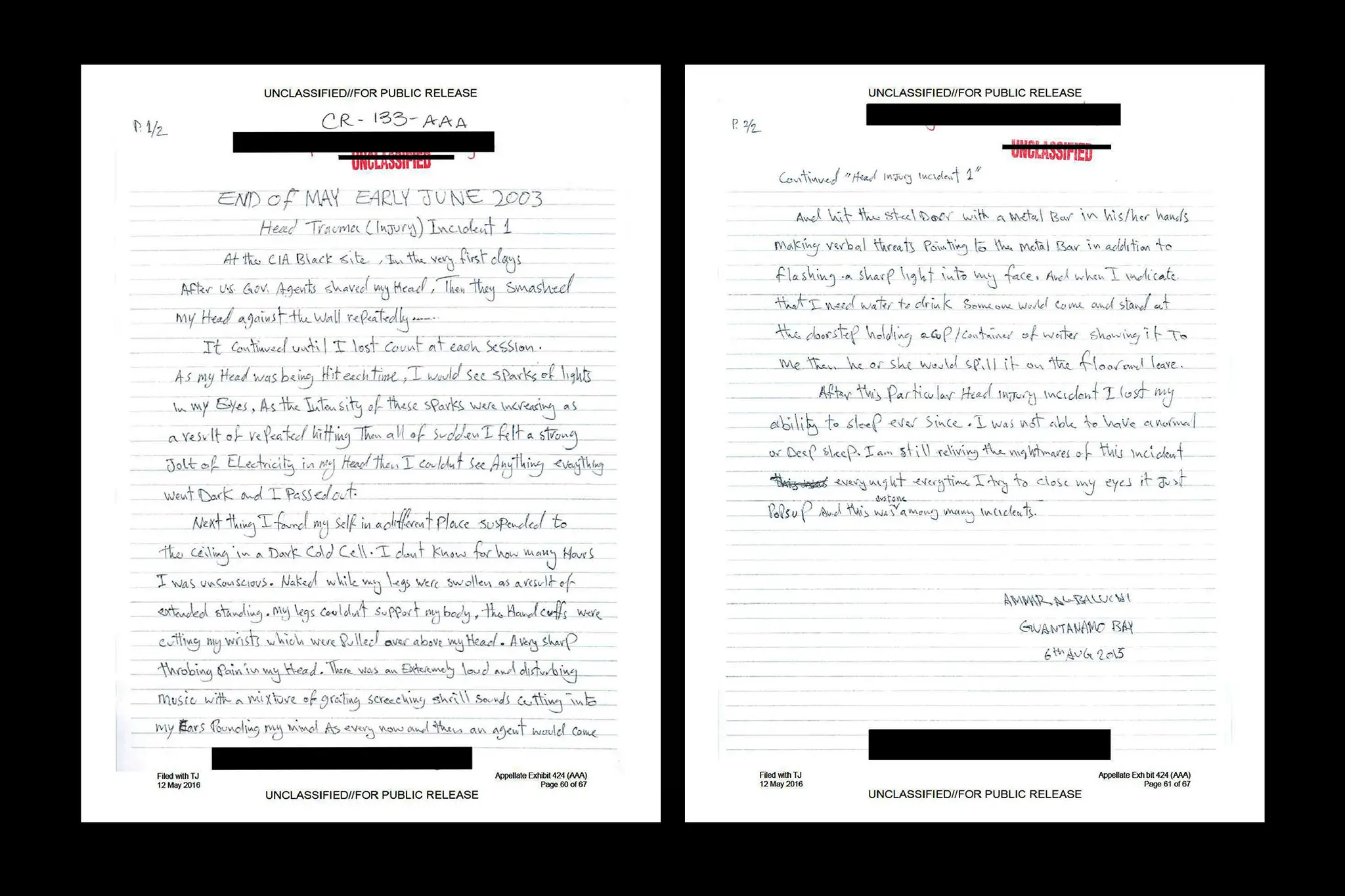
Unclassified documents in which al-Baluchi recounts the torture he endured
Baluchi’s account of the abuse is rather different. After undergoing an MRI scan in 2018 that found “abnormalities indicating moderate to severe brain damage…consistent with traumatic brain injury,” he described how each time his head struck the wall, “I would see sparks of lights in my eyes.” He further attested:
The intensity of the sparks was increasing as a result of repeated hitting. All of a sudden I felt a strong jolt of electricity in my head; then I couldn’t see anything and everything went dark and I passed out. I wasn’t just suspended to the ceiling, I was naked, starved, dehydrated, cold, hooded, verbally threatened, in pain from the beating and water-drowning, as my head was smashed against the wall dozens and dozens of times.”
Upon the Inspector General report’s release, Baluchi’s attorney Alka Pradhan likened his treatment to “human experimentation.” This categorization was even more apt than likely intended. A rarely acknowledged, sinister truth is that prisoners of the CIA throughout the War on Terror served as guinea pigs in an extension of a grand, macabre Agency experiment that began decades earlier, named MKULTRA.
In the process, these unwitting and unwilling test subjects provided living demonstrations of the efficacy of Langley’s long-patented secret torture and brainwashing techniques, while granting the CIA a wealth of fresh insight into how best to tear human minds apart and put them together again in shapes of its own choosing.
“No force or coercion”
MKULTRA itself represented a continuation of bloodcurdling human experimentation undertaken in Nazi concentration camps and by Japan’s infamous Unit 731 during World War II. Under its auspices, the CIA sought to develop “chemical, biological, and radiological materials capable of employment in clandestine operations to control human behavior,” and “increase the effectiveness of interrogation of hostile subjects.”
Sensory deprivation was a key tactic – and objective — of these efforts. Its efficacy as a psychological torture method was amply established by MKULTRA’s precursor, Project ARTICHOKE. In 1951, the CIA covertly sponsored an experiment in which 22 student volunteers at McGill University were placed in cubicles, wearing blackened goggles, earmuffs playing constant white noise, mittens, and cardboard tubes over their forearms.
It took just 48 hours for participants to experience intense hallucinations comparable to the effects of the psychedelic drug mescaline, and exhibit psychosis. One student suffered a complete, enduring mental breakdown. The academic who conducted the study later remarked that the results “scared the hell out of us.”
By contrast, the CIA was thrilled: Agency doctor Lawrence Hinkle, of Cornell University, said the technique was “the ideal way of ‘breaking down’ a prisoner…it seems to create precisely the state the interrogator desires: malleability and the desire to talk, with the added advantage that one can delude himself that he is using no force or coercion.”
Fast forward to 2002, and word that the CIA was torturing terror suspects began to proliferate among Western journalists and NGOs in Afghanistan, courtesy of Red Cross investigators who visited interrogation sites within and outside the country.
No mention of this surfaced in the mainstream media at the time, not least owing to the difficulty of corroborating the incendiary charge – although incontrovertible supporting evidence lurked in plain sight, plastered on newspaper front pages the world over.
Widely circulated photos of Guantanamo Bay’s first inductees, taken in January that year by an in-house U.S. Navy photographer, showed them to be gagged, outfitted with blackened goggles, ear defenders and thick gloves, in the precise manner of the McGill students.
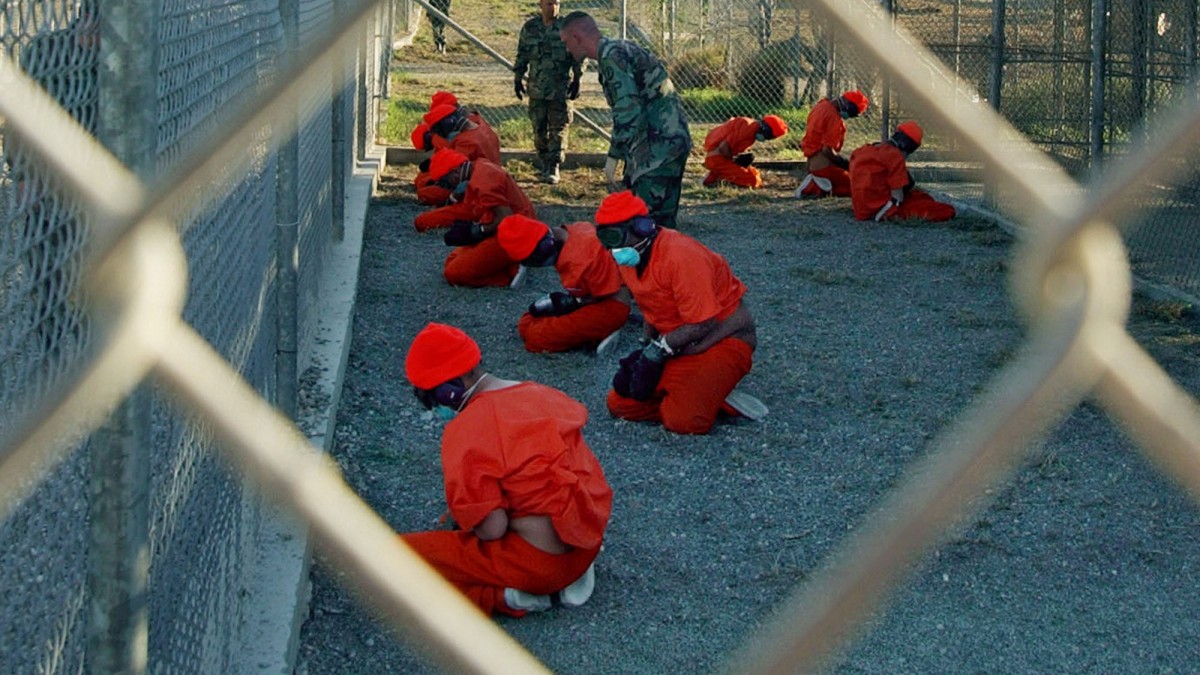
Detainees sit in a holding at Guantanamo’s Camp X-Ray. Photo | AP
These measures were applied to inmates whenever they were taken outside their cell for any reason – even dentist visits. The 2008 Inspector General report refers to Baluchi being blindfolded, hands and feet shackled, mouth covered “to prevent him from communicating,” and noise suppressors placed over his ears “to prevent him from hearing ambient sounds,” as “standard rendition procedure.”
The review also notes that on at least one occasion, Baluchi was forced to drink a nameless medicine – he subsequently “went crazy.” This highlights another fundamental synergy between MKULTRA and the CIA’s torture program: the widespread doping of targets with psychedelic drugs, without their consent.
Dozens of current and former CIA prisoners have testified that they were given pills, or injected with substances, without any clarity on what they contained. If an inmate refused, Guantanamo’s notorious “Immediate Reaction Force,” responsible for pacifying combative detainees, was summoned to administer the medication via brute coercion.
These drugs often had absolutely ravaging consequences for other recipients too. Excessive, unnecessary dosing of antimalarial drug mefloquine – five times the recommended amount — led to inmates swelling like balloons, with “swollen heads, swollen hands.” Known side effects include anxiety, paranoia, depression, hallucinations and psychotic behavior, and its use by U.S. soldiers has been linked to suicides and murders.
Adnan Latif, who died in Guantamo Bay – purportedly by suicide — in 2012, told his lawyers that he was subject to injections in his sleep, and frequently plied with pills, which made him feel like “a zombie.” An autopsy found a bizarre, extremely dangerous cocktail of prescription drugs and morphine in his system.
A 2009 internal Pentagon review failed to conclusively determine whether mind-altering drugs were used to make prisoners more cooperative; yet a 2003 Justice Department memo, declassified the previous year, showed that a decades-old ban on the use of such substances in interrogations was shredded for the purposes of the CIA’s torture program.
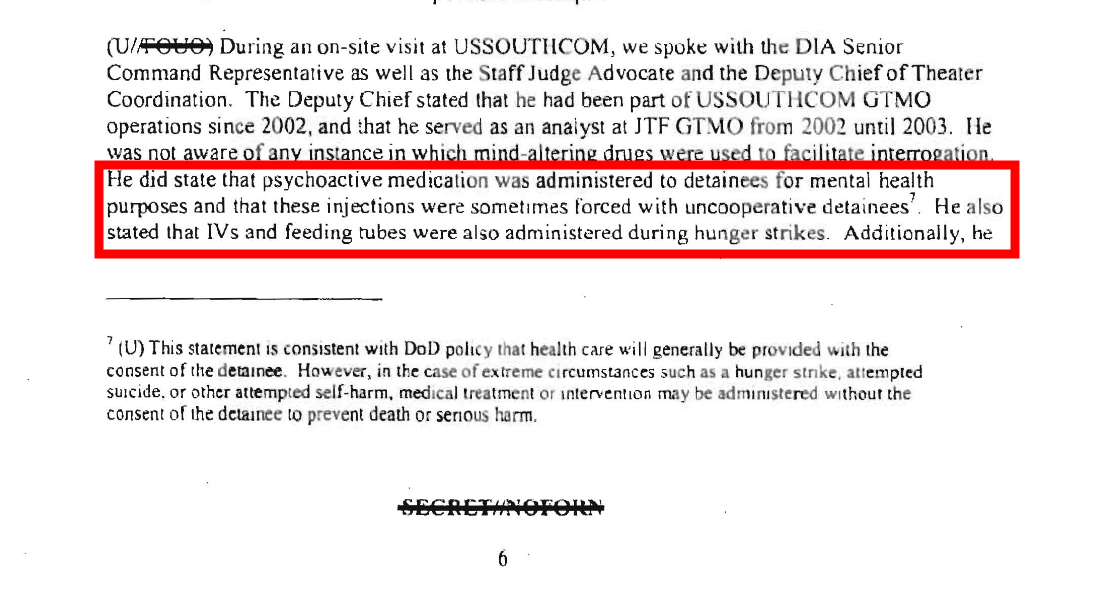
.
In any event, given the wide-ranging physical and psychological torture to which inmates were subjected, it’s impossible to quantify what if any role mind-altering substances may have played in making detainees talk – but talk they nearly all did, eventually.
“I said anything”
The Senate Intelligence Committee’s probe of the torture program concluded that enhanced techniques did not produce a single shred of useful, unique intelligence that hadn’t already been gleaned from other sources and methods.
Instead, CIA prisoners almost universally told their interrogators what they thought the Agency wanted to hear, provided false confessions and admitted to impossible crimes, in order to curtail their suffering. The Inspector General report further underlines that the CIA itself was well aware of this, finding that Baluchi provided no worthwhile intelligence of any kind, and “fabricated the information he provided” while being tortured.
The Committee’s findings were widely portrayed in the media as a testament to the program’s failure, but such analysis overlooks the obvious question of whether the Agency deliberately sought false testimony in order to achieve preordained results. Were they trying to get information out of prisoners, or trying to get information into them to substantiate and justify what the Agency was saying and doing?
Following 9/11, the U.S. government was in urgent need of fast, actionable intelligence to justify long-planned imperial interventions in the Middle East, and draconian, civil liberty-busting surveillance measures at home. As such, it was necessary to identify – or even concoct — a global terror threat to fight, as rapidly as possible.
One of the core foundations of the Iraq War — the oft-cited claim that Baghdad had tutored al-Qaeda in the use of chemical and biological weapons – was based on the testimony of a suspected al-Qaeda operative whom the CIA knew to be “likely intentionally misleading” his interrogators in Egypt, a country well known for widespread use of torture.
Along the way, countless people were falsely fingered as al-Qaeda operatives by other detainees, as a result of CIA coercion. Accordingly, of the 800 men imprisoned at Guantanamo since 2002, most were released without charge, in many cases years after the CIA determined they were innocent. Permanent psychological scars from the experience are common.
Baluchi may himself be an example of a guiltless party incarcerated on baseless charges. He claims to have had no idea the individuals he was assisting were terrorists, and acting as a courier, frequently delivered support to Muslims overseas on behalf of wealthy benefactors in order to supplement his income. The Inspector General report could identify no reasonable grounds for his imprisonment, judging the CIA’s rationale to be “fuzzy and circular.”
Interrogators at first merely “assumed” he was withholding information about “imminent threats” to the U.S., based on what they felt he “could [emphasis added] have known,” and statements from other inmates – themselves obtained via torture.
As the brutality ratcheted up, Baluchi became “compliant” in order “to try to end the techniques,” and for fear he would be killed if he didn’t cooperate, offering “tidbits” to his interrogators, which then served as justification for his continued imprisonment and abuse. In his own words, “I said anything when being tortured.”
“He was afraid to tell a lie and was afraid to tell the truth, because he did not know how either would be received,” the report noted.
Psychic driving
One of the most infamous MKULTRA experiments was known as psychic driving, through which psychiatrist Donald Ewen Cameron gave patients incapacitating drug cocktails and electric shocks while they listened to hours of recorded audio messages, in order to render their mind a “blank slate” onto which new behaviors, thoughts, memories, and personalities could be implanted.
Just like the CIA’s torture program, received wisdom holds that this effort was a failure. While it did create “blank slates,” in that test subjects suffered wide-ranging memory loss, Cameron was unable to effectively “reprogram” them thereafter.
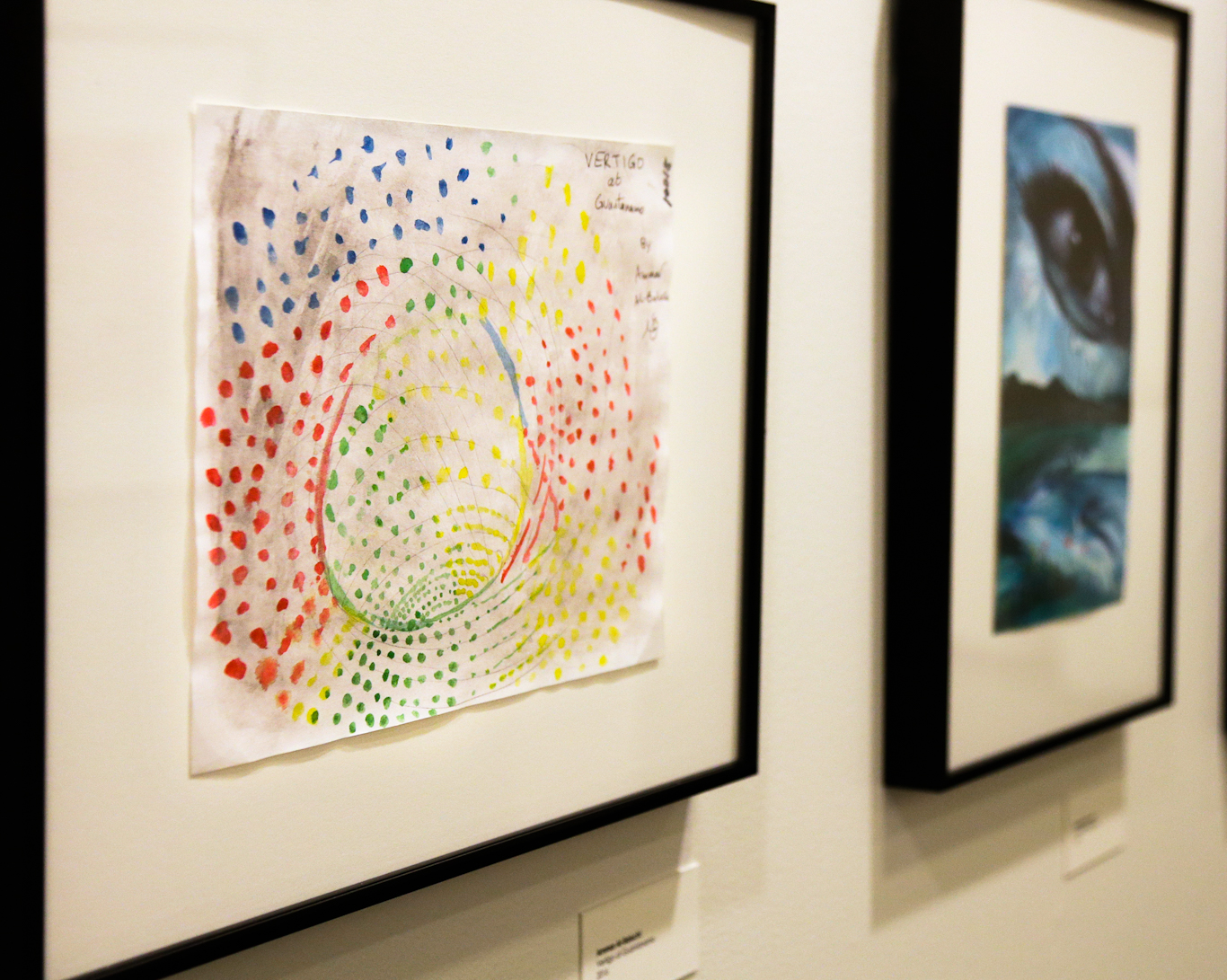
Artwork made by Ammar Al Baluchi in his Guantanamo cell. Seth Wenig | AP
Still, he considered the “primary values” of psychic driving to be “penetration of defenses [and] elicitation of hitherto inaccessible material” – and, given the similarities between his techniques and what was practiced on CIA prisoners, it’s clear the Agency considers them worthwhile to this day.
By psychologically destroying inmates, Langley could transform them into whomever and whatever it wanted and needed them to be at any given time. And in distorting their minds, the Agency corrupted global perceptions.
What’s more, there’s every reason to think the strategies honed by the CIA over the course of the program endure today. Researcher Jeff Kaye, who has conducted pioneering work on U.S. torture and biological warfare, tells MintPress that Langely’s “torture enterprise” was also codified in the 2006 Army Field Manual (AFM) on interrogations, “which Democrats pushed as an alternative to the CIA’s own torture program.”
This was effectively MKULTRA “reduced to its essentials, relying on isolation, sensory deprivation, and sleep deprivation, along with so-called legal techniques like ‘fear up,’ ‘emotional ego down’ and ‘emotional futility’ to break down individuals by creating feelings of degradation, dependency and dread within them,” Kaye says.
Similarly, in the Army’s Manual, which 2016 Congressional legislation enshrined as the approved way to interrogate prisoners held by the CIA and military, the “futility” technique is used to engender “a feeling of hopelessness and helplessness in prisoners.” Kaye chillingly concludes:
The manual’s “Field Expedient Interrogation” method (found in the AFM’s Appendix M) includes the placing of earmuffs and blackout goggles or blindfolds on prisoners, in order to “prolong the shock of capture” and “foster a feeling of futility.” The poison of the MKULTRA program has spread to infect the entire U.S. military and CIA, which now “legally” can torture, while the political establishment withholds prosecution of anyone accused of torture.”
Feature photo | MintPress News
Kit Klarenberg is an investigative journalist and MintPresss News contributor exploring the role of intelligence services in shaping politics and perceptions. His work has previously appeared in The Cradle, Declassified UK, and Grayzone. Follow him on Twitter @KitKlarenberg.
The post CIA Files Confirm Guantanamo Bay Torture Program’s MKULTRA Roots appeared first on MintPress News.
